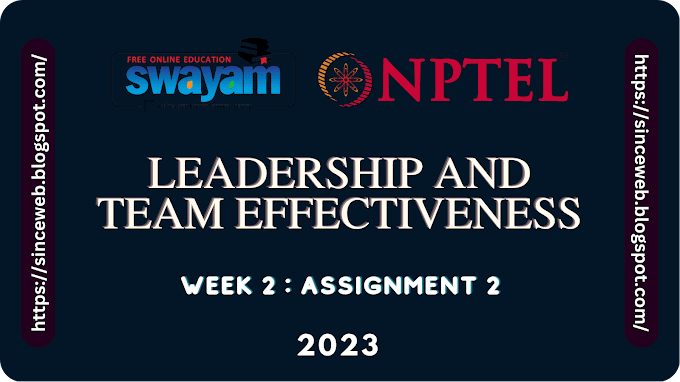NPTEL Principles of Management Week 1 Assignment Answer 2023
 |
Principles of Management Week 1 Assignment Answer NPTEL 2023
Stay on top of your NPTEL Principles of Management course with our expert guidance and accurate answers. Get the answers to the Week 1 Assignment for 2023 on our site. With our comprehensive solutions, you will understand the fundamental principles of management and excel in your studies. Our up-to-date assignment answers will boost your grades and help you stay ahead of your coursework
About NPTEL Principles of Management
Principles of management are the fundamental guidelines or rules that organizations use to direct and control their operations. These principles include planning, organizing, leading, and controlling.
- Planning: Involves setting goals and objectives, developing strategies to achieve them, and creating action plans to implement those strategies.
- Organizing: Involves allocating resources, such as people, equipment, and finances, and establishing structures and systems to manage them effectively.
- Leading: Involves motivating and directing employees to achieve the goals and objectives set by the organization.
- Controlling: Involves monitoring performance, identifying deviations from plans, and taking corrective action to ensure that goals and objectives are met.
Below You can find Answer for Principles of Management Answer :
Assignment Answers
Answer For Principles of Management Week 1 Assignment 2023:
- It reminds us that management is not value-neutral – There are moral responsibilities inherent in being a manager.
- It helps you to understand where you and the other managers lie along a continuum
- None of these options
- It reminds us that management is not value-neutral – There are moral responsibilities inherent in being a manager and it also helps us to understand where we and other other managers lie along a continuum
- Planning
- Organizing
- Leading
- Controlling
- Management is the art of getting things done through and with people in formally organized groups.
- Management is a multi-purpose organ that manages a business, manages managers and manages workers and work.
- Management is the process of planning, organizing, leading, controlling human and other organizational resources with the aim of achieving organizational goals efficiently and effectively.
- The process of planning, organizing, leading, controlling human and other organizational resources with the aim of achieving organizational goals virtuously and effectively.
- Statement 1 is correct, statement 2 is incorrect
- Statement 1 is incorrect, statement 1 is correct
- Both statements are incorrect
- Both statements are correct
- Discrimination concerns
- Work-life balance
- Increased accountability
- Shifting organizational boundaries
- Technical Skills
- Human Skills
- Conceptual Skills
- All the skills
- Spokesperson
- Leader
- Disturbance Handler
- Liaison
- Executive managers
- Top managers
- Middle managers
- First-line managers
- Responsibilities
- Functions
- Skills
- Roles
- Striking a balance to maintain ecological safety, social justice, and emphasis on human dignity and happiness
- Maximising benefits of multiple stakeholders
- Maximisation of profit
- Addressing problems of workplace diversity
Disclaimer:
The answers provided in this blogpost are for reference only and should not be used as a substitute for your own research and understanding of the subject matter. The answers have been researched and compiled to the best of our knowledge, but we cannot guarantee their accuracy or completeness. We strongly advise that you use this information as a starting point for your own research and not as the sole basis for your work. Please use your own discretion and always consult your instructor or professor for guidance.














.png)

